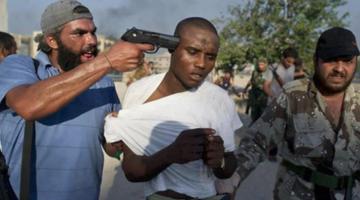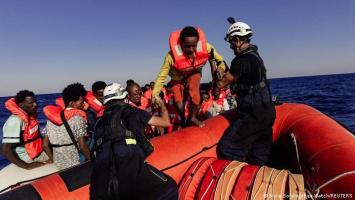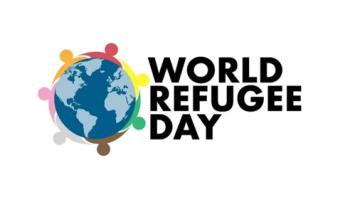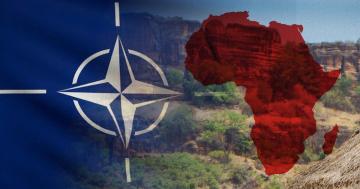Essam Elkorghli reviews the book, Everyday Politics in the Libyan Arab Jamahiriya by Matteo Capasso, which discusses the history and politics of Libya in the decades leading up to the 2011 uprising and subsequent NATO intervention.
On the 17th of February 2024, few Libyans commemorated the 13th anniversary of the NATO-led regime change that led to the destruction of Libya. As the people dwell in intense economic immiseration, sanctions, and lack of reconciling with their national history, reading a recently published book by Matteo Capasso, might shed some light on how Libyans could think about their history and how to reconcile with the events that led to the reproductive destruction of the country since 2011.
The recently published book on Libya, Everyday Politics in the Libyan Arab Jamahiriya, is unique in its approach to how Libyans navigated everyday politics in a country marred by colossal international pressures that marked the three decades leading up to the 2011 uprising and the NATO intervention that sanctioned the fall of regime. Matteo Capasso confronts the existing literature that frames Libya as stateless society for its direct democracy, authoritarian state where all successes and ills are solely the product of a single person (Muammar Qaddafi), or that the state is a rogue one as it carries its national and international policies in ill-studied manner rendering the regime an unpredictably perilous one. Capasso challenges these hot takes not by dismissing them but by bringing in the voices of ordinary Libyans to show how the everyday is more complicated than most of the post-2011 literature on Libya; centering people’s voices vis-á-vis the impact of the international pressures that collectively imposed on the people of Libya (i.e. sanctions as economic warfare).
As the title suggests, it does not propose a one-man show such as the number of literature produced after 2011 that equates the Qaddafi persona with the state, with titles such as Qaddafi’s Libya, Libya under Qaddafi, Rise and Fall of Qaddafi, etc. Capasso argues that the category of authoritarianism is not analytical and reduces the complexity of politics and economics to a sole figure. He further explains,
“Scholars and analysts have taken the part (Qaddafi) for the whole (Libya), assuming that there was no Libya-ness beyond the macrohistorical metanarrative of Qaddafi-ness. The ideas and personality of Qaddafi obscured Libya’s complexity… This turned Libya into a perfect terrain for studying authoritarianism and other types of regime behavior” (p. 6).
Alternatively, through oral history interviews with sixty-six Libyans (most if not all were men) interviewed while being outside of Libya (not diaspora), Capasso weaves how Libyans perceived the state, its (dis)functions, and how they survived the everyday under a regime that was experiencing various forms of pressures. In other words, these oral history interviews shine a light on the connection between the voice of Libyans and how they experienced the everyday in the Libyan Arab Jamahiriya (the official name of Libya prior to 2011). Despite the existence of literature on the role of the “diaspora” and how they were a function of regime changes in the region, this book weaves a unique connection that is missing from that literature, and that is by tying the dialectic of the local (everyday) with the national (regime and its policies), and how those two intersected continuously with the global (international relations).
An integral part of the book sheds light on how sanctions not only impact state functions but also the everyday, both on material and ideological levels. Libya’s support for liberation movements in South Africa, Nicaragua, Ireland, and Palestine, just to name a few, was met with “geopolitical violence” (p. 27). The gradual sanctions imposed by the United States were followed by several European countries doing the same. The mainstream logic of the sanctions is to impose financial restrictions on the regime to cripple the state and its functions, which will hopefully result in mass distaste of the regime by the masses that become mobilized and seek regime change. This recipe did not work in Libya. Because, as Capasso argues, the policies of the regime were not spearheaded by the Qaddafi person himself, but that they had a greater appeal by the people. And secondly, by tracing the everyday, Capasso showed how the sanctions caused immense hardships lived by the people and saw the state's socialist functions dwindle, but the people still managed through various survivalist techniques. One of these influential strata of society are called by Capasso’s interlocutor, the “fat cats” (al-qtat al-simãn) (p. 93). These were plebeians who managed to use the outsourcing the state undertook to the private sector, where the latter usurped profits and contributed to value drain. As opposed to lifting the burden of the sanctions on the country, these growing compradors contributed to the increase of cost of living. Inasmuch as this is often portrayed as statist corruption, Capasso’s interlocutors and their experiences in the Libyan Arab Jamahiriya showed how sanctions proliferate corruption and produce such an opportunist class.
Another key issue tied to sanctions and the everyday is state ideology and how it is interpellated by the people. When the Libyan Arab Jamahiriya took on the socialist path for national development — nationalization of oil, affordable housing, industrialization and manufacturing, expansion of free education and health care, and other social welfare policies — overall acceptance of the regime by the people was widespread, making the masses appreciative of the fruits yielded from such socialist policies. But given the stringent economic conditions that were imposed on Libya through economic warfare, state ideology (manifested in socialism and anti-imperialism) became less palatable for the Libyans. This book draws the connection between the growing distaste of socialism in third world contexts due to sanctions, making sanctions not only a tool of economic warfare but also ideological subjugation of the nation to the ideals of so-called rules-based world order. The disconnect between state ideology and the people was not remedied even in the years that followed the lifting of the sanctions in the early 2000s. Instead, Libyans often looked to the United Arab Emirates and wondered why Libya’s coastal city of Sirte was not like UAE’s Dubai. These voices who lionized Dubai opened the gateway for UAE and Qatar to partake in the NATO-led intervention and the bombing of Libya, because those two Arab-Muslim countries delegitimated any critics of the NATO intervention as a crusade. Qatar and Emirates are Arab and Muslim countries after all. Ultimately, the fermenting disconnect did not play in the regime’s favor as Libyans felt detached from the country’s Pan-Africanist orientation.
In an exhaustive chapter on the city of Sirte, the birthplace of the African Union (9.9.1999) and the place with most NATO destruction in 2011, Capasso draws contrasting connection between this city and what it represented and what those who aspired to transform Libya’s cities into a northern African Dubai. It is clear that Dubai is a manifestation of capitalist modernity with imperialist characteristics (i.e. exploitative migrant labor, human rights abuses of workers, etc.), such that UAE in overall, and Dubai particularly, resembles an economic hub where drug trafficking, money laundering, and tax havens allow the transnational capitalist class to maneuver the global economy for their benefit, and simultaneously a depoliticized populace that “does not care about politics… the regime, elections, who will be the leader” (p. 122). On the other hand, when contrasted to what Sirte was planned to be, which is a financial and cultural hub for the planned African financial institutions that was predicated on forging African development with its own African gold-backed currency, Sirte, as a geopolitical project, represents the negation of what Dubai is. When Capasso highlights what his interlocutors envisioned what Libya could be, the conversation focused on the aspiration of becoming a Dubai-like replica. Yet, few interlocutors noted the lack of geopolitical sovereignty of UAE and its positionality in relation to US-led imperialism. This became obvious when the destruction of Libya by NATO (and Qatar and UAE) in 2011 allowed Dubai to maintain its monopoly over ports and exacerbated the expansion of US imperialism through wars and armament shipments in Yemen and many African countries, which eventually enabled the expansion of AFRICOM.
The book is not solely about sanctions and the narratives of the everyday as they intertwined with global isolationism imposed on Libya, it is also about humor, surveillance, mockery, and quotidian survivalist acts of non-resistance. Capasso’s interlocutors share stories of wives reporting on their husbands to show how surveillance influenced the everyday. Jokes that mimicked Qaddafi and his family as acts of making fun of their lives represented a simulacrum of bigger issues such as surveillance, gender roles in society, and corruption. Capasso challenges the literature that situates such humor within the category of acts of resistance by arguing that these sporadic, non-organized acts do not produce any structural challenges to regimes of power, but they are just cultural everyday acts that reproduce hierarchies of power. This book is a grand contribution to the literature on Libya, especially its counter think-tank (i.e. Atlantic Council, EU, RAND Corporation, etc.) narratives about Libya. This book is a must read for those interested in concepts related to imperialism, reactionism, and militarism in northern Africa, as well as people who enjoy political science, international relations, history, and cultural politics.
Essam Elkorghli is a Libyan PhD student at the University of Illinois at Urbana-Champaign. He researches Libya’s modern political history and contemporary imperialism in education. He is a labor organizer with the Graduate Employees’ Organization, assistant editor for Middle East Critique Journal, and a member of the Global Pan African Movement.



















